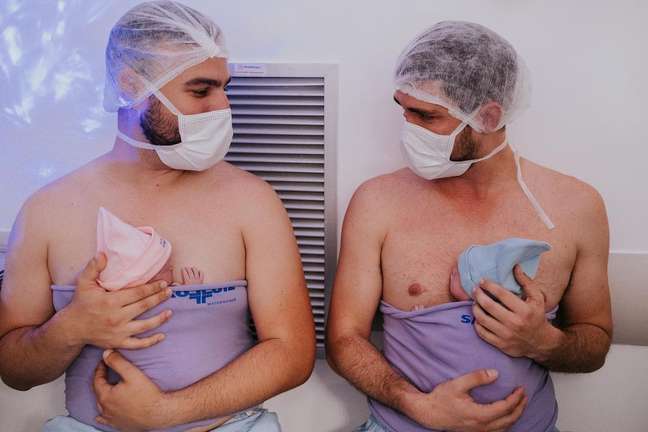The topic returns to the media with socialite and entrepreneur Khloé Kardashian, who will have second child from a surrogate

There are numerous reasons that prevent a person with a uterus from having a baby, but none rule out the possibility of pregnancy. Business woman and model Khloé Kardashian, for example, will have her second child by basketball player Tristan Thompson, this time via surrogacy. They are already the parents of True, 4 years old.
According to People magazine, the baby was conceived in November last year. In the reality show following the lives of her and her sisters, Khloé said doctors informed her that she would have a high-risk pregnancy if she chose to manage another baby.
Surrogacy is a common alternative in several countries, such as the United States, and is none other than someone who gives up their body to give birth to another couple’s child, for a fee for the service provided. The practice is illegal in Brazil and may be covered by the Transplant Law, which prohibits the sale of embryos and non-renewable human body parts, and the Biosecurity Law, which covers assisted reproduction.
On the other hand, Brazilian legislation authorizes the supportive belly. Unlike surrogacy, it does not involve payment and must follow a series of rules described in resolution no. 2294/21, established by the Federal Council of Medicine (FCM).
“The candidate must have a degree of kinship up to the fourth degree with the couple, cannot involve pay, must be under 50 years old and have good clinical and psychological health”, explains gynecologist Adelino Amaral, member of the Brazilian Reproductive Society. Human.
The belly of solidarity is the realization of life
The couple Robert Rosselló, 31, and Gustavo Catunda, 29, believe that if there had been surrogacy in Brazil, they could have realized the dream of fatherhood earlier.

The two met in their freshman year of college and, after becoming best friends, found they had more feelings for each other. After three months of dating, they started living together and always idealized what it would be like to have children, the couple’s dream.
“We knew each other’s desire to be a father, we thought about it in different ways, and also about how to have children who had our genetics,” recalls Catunda.
The couple thought of everything from adoption to surrogacy in other countries, but there were many obstacles. The first, and alarming, is that only two countries in the world allow same-sex couples to be rented, the United States and Colombia. The second was the price.
“At the time we started studying the possibility, it cost about 60 thousand dollars [cerca de R$ 324,5 mil na cotação atual] give birth to a child in Colombia and 100,000 dollars [cerca de R$ 540,9 mil na cotação atual] in the United States. It was a possibility for a few “, adds Rossello.
The couple’s situation began to improve after the CFM approved that the egg donation for supportive belly should be done by someone close to the couple. Previously, the practice was forbidden and the egg had to come from an anonymous donor.
With the move, the two are now parents of Marc and Maya. The children were generated by Lorenna Resende, Gustavo Catunda’s cousin, with an egg donated by her sister, Camila Catunda. The two became the first gay-cis couple to have children with their genetics.
“It seems that the love we felt has managed to increase. It is the fulfillment of life for us”, celebrates Rosselló.
“It’s also a question of representation. While LGBT + lacks a reference that it is possible to be happy, build a family if you want,” Catunda points out.
Brazil does not have a law that deals with the supportive belly
Brazil does not have specific legislation for the supportive belly. The regulations of the Federal Council of Medicine are applicable to professionals in the area, but do not have the force of law for society at large, according to lawyer Lana Castelões.
The specialist advises that, in this case, the concerned parents sign a written agreement, through professional guidance, to anticipate any legal obstacles.
“Think of the case of the person who lent the belly refuses to deliver the baby. What can the couple do to claim the baby? All this must be included in the contract,” Castelões leads.
Family lawyer Isadora Dourado Rocha stresses the importance of signing the terms to ensure that the paternity or maternity to be formed in the registry is not linked to the pregnant woman.
“That is, she is pregnant, but she will not be a mother. These terms guarantee future registration,” she adds.
Surrogacy is prohibited in Brazil
Although there is no specific law for supportive belly, there is a law prohibiting payment for a pregnancy, a practice that characterizes surrogacy. “In Brazil it is a crime, with a sentence of 3 to 8 years in prison and a fine, as described in article 15 of the transplant law”, explains the lawyer Lana Castelões.
But she defends the regulation of surrogacy in Brazil, to prevent women from submitting to the practice clandestinely. According to a BBC Brasil report, released in 2018, women charged R $ 15 to R $ 100,000 to handle a baby.
“When there is a regulation, there is greater protection for all parties involved”, adds Castelões.
But family lawyer Isadora Dourado Rocha disagrees with the possible benefits of this legislation. For her, the legalization of surrogacy can impact people in situations of social vulnerability.
«It is a way to protect women from becoming the target of the sale of their bodies as a means of subsistence, even more so in scenarios of social precariousness. Instead, there is a very strong logic that treatment must be free, that it is love, and only love, and not also work “, she reflects.
* With editing by Estela Marques.
Source: Terra
Benjamin Smith is a fashion journalist and author at Gossipify, known for his coverage of the latest fashion trends and industry insights. He writes about clothing, shoes, accessories, and runway shows, providing in-depth analysis and unique perspectives. He’s respected for his ability to spot emerging designers and trends, and for providing practical fashion advice to readers.






